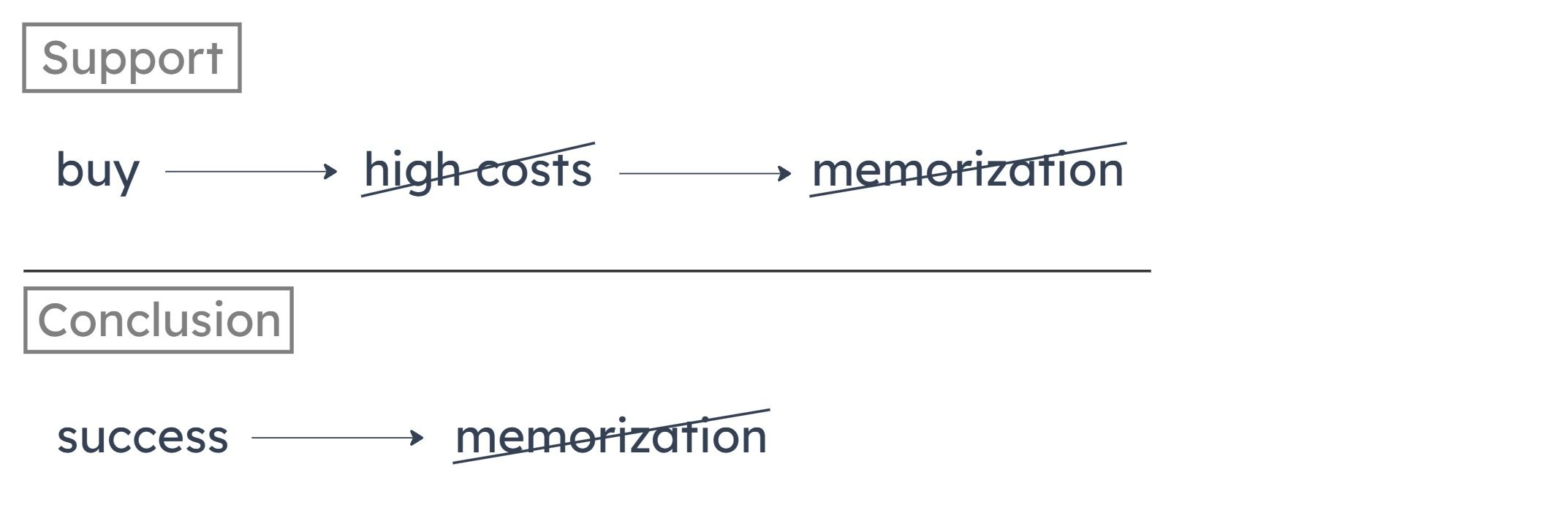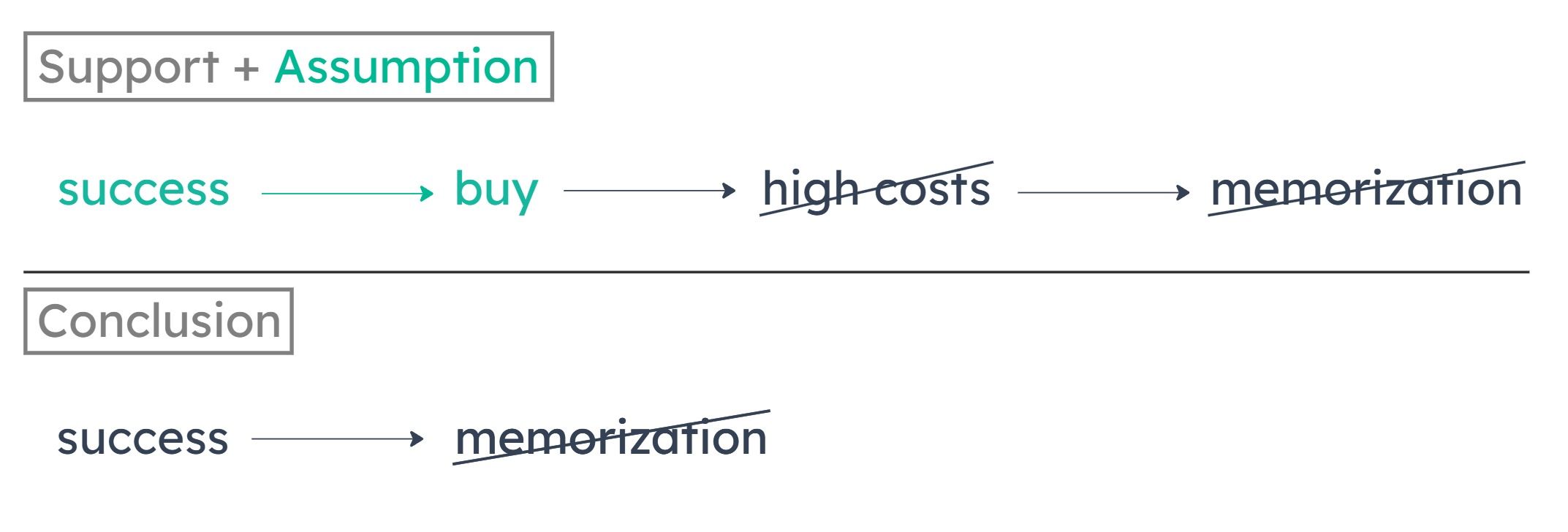Smoker: But it is equally well established that regularly eating high-fat, high-cholesterol foods causes as many serious health problems as does smoking, yet it would be manifestly unreasonable to force those who purchase such foods to bear the burden of financing this campaign.
Speaker 1 Summary
The politician argues that a new health-awareness campaign should be funded by taxing cigarettes. As support, the politician says that smoking causes many health problems, and that it is reasonable to cover the campaign’s cost by taxing people whose habits cause health problems. Thus, it is reasonable to tax smokers.
Speaker 2 Summary
The smoker supports the unstated conclusion that it is not reasonable for smokers to bear the costs of this campaign. The smoker uses an analogy as support: consuming high-fat, high-cholesterol foods causes comparable health issues to smoking, but it is unreasonable to charge those consumers for the campaign’s costs. This implies that it is also unreasonable to charge smokers.
Objective
We need to find a point of disagreement. The speakers disagree on whether or not funding the campaign by taxing smokers is reasonable.
A
whether the politician’s proposal for financing the health-awareness campaign is an unreasonable one
The politician agrees with this point but the smoker disagrees, making it the point at issue. The politician argues that the proposal to tax smokers is reasonable, while the smoker’s argument supports the implicit conclusion that taxing smokers is unreasonable.
B
whether smokers are more aware of the harmful effects of their habit than are people who regularly eat high-fat, high-cholesterol foods
Neither speaker discusses people’s awareness of the health impacts of either of these habits. The focus is on the effects of these habits, not people’s perception of those effects.
C
whether the effects of smoking constitute a greater health hazard than do the effects of regularly eating high-fat, high-cholesterol foods
The smoker disagrees with this, instead claiming that the two habits cause roughly equal health problems. On the other hand, the politician never offers an opinion about the health impacts of eating certain foods. We can’t know if the speakers disagree about this.
D
whether it is unreasonable to require people who do not benefit from certain governmental programs to share the costs of those programs
Neither speaker brings up who benefits from governmental programs, nor does either one suggest distributing the costs based on who benefits.
E
whether the proposed increase on cigarette taxes is an efficient means of financing the health-awareness campaign
Neither speaker actually indicates how efficient the increased cigarette tax would be as a method of funding the campaign. Each speaker is just focused on whether the proposal is reasonable or not.
Summary
The argument concludes that in order to be successful, the software cannot demand memorization of unfamiliar commands. This is based on the following two premises:
If training costs are high, prime purchasers of the software won’t buy it.
If a software demands memorization of unfamiliar commands, then the training costs are high.
If training costs are high, prime purchasers of the software won’t buy it.
If a software demands memorization of unfamiliar commands, then the training costs are high.

Missing Connection
We want to reach the conclusion that if a software demands memorization of unfamiliar commands, it won’t be successful. “Won’t be successful” is a new concept in the conclusion; the premises don’t tell us what leads to lack of success.
But we do know from the two premises together that if a software demands memorization of unfamiliar commands, the prime purchasers won’t buy it.
If we learn that “prime purchasers won’t buy” establishes “unsuccessful,” that will establish that if a software demands memorization of unfamiliar commands, it won’t be successful. In other words, we want to learn that in order to be successful, a software needs prime purchasers to buy it.
But we do know from the two premises together that if a software demands memorization of unfamiliar commands, the prime purchasers won’t buy it.
If we learn that “prime purchasers won’t buy” establishes “unsuccessful,” that will establish that if a software demands memorization of unfamiliar commands, it won’t be successful. In other words, we want to learn that in order to be successful, a software needs prime purchasers to buy it.
A
If most prime purchasers of computer software buy a software product, that product will be successful.
(A) establishes what is sufficient for a software product to be successful. But we’re trying to establish what’s sufficient for a software product to be UNsuccessful. Or, you could also say that we’re looking for what’s necessary for the product to be successful. Learning what’s sufficient for success doesn’t prove what’s necessary for success.
B
Commercial computer software that does not require users to memorize unfamiliar commands is no more expensive than software that does.
(B) compares the expense of different kinds of software. But it doesn’t tell us anything about what’s required for success, or what’s sufficient to lead to lack of success.
C
Commercial computer software will not be successful unless prime purchasers buy it.
(C) establishes that in order for a software product to be successful, its prime purchasers must buy it. Since we know from the premises that if a product demands memorization of unfamiliar commands, prime purchasers won’t buy it, adding (C) now establishes that if a product demands memorization of unfamiliar commands, it won’t be successful.

D
If the initial cost of computer software is high, but the cost of training users is low, prime purchasers will still buy that software.
(D) doesn’t tell us anything about what’s required for success, or what’s sufficient to lead to lack of success.
E
The more difficult it is to learn how to use a piece of software, the more expensive it is to teach a person to use that software.
(E) doesn’t tell us anything about what’s required for success, or what’s sufficient to lead to lack of success.
Summarize Argument
The author concludes that some reporter can scoop all of the other reporters. This is based on the following:
All that any reporter knows about the accident is what the press agent said.
If the agent told every reporter everything, then each reporter knows the same amount as every other reporter.
If each reporter knows the same amount as every other reporter, a scoop is not possible.
But, the press agent did not tell every reporter everything.
Identify and Describe Flaw
The author assumes that if the agent did not tell every reporter everything, that at least one reporter knows more than every other reporter. This assumption is faulty because it’s possible each reporter still knows the same amount as every other reporter, even if the agent withheld some information.
A
The press agent did not tell everything about the accident to any reporter.
This possibility doesn’t show why the reasoning is flawed. One reporter can still know more than all others, even if nobody knows everything. So this doesn’t show why a reporter might not be able to scoop the others.
B
Even if some reporter knows more about the accident than all of the other reporters, that reporter need not scoop any other reporter.
Whether a reporter “needs” to or will scoop others is irrelevant. The argument concerns whether at least one reporter “can,” meaning has the ability to, scoop other reporters. A reporter might have the ability to scoop others, even if they don’t actually scoop the others.
C
Some reporter may have been told something about the accident that the reporter tells all of the other reporters.
This possibility does not show why the argument is flawed. If one reporter shares something they were told to all other reporters, it’s still possible for one reporter to know more than all the others. So (C) doesn’t show why scooping might not be possible.
D
The press agent may not know any more about the accident than the most knowledgeable reporter.
This possibility does not show why the argument is flawed. One reporter can still know more than all others, even if that reporter doesn’t know more than the press agent. So (D) doesn’t show why scooping might not be possible.
E
No reporter knows any more about the accident than any other reporter.
If this possibility were true, then it’s impossible for one reporter to scoop another, because each reporter would know the same amount as every other reporter. The agent might not have told everything, but the reporters can still end up knowing the same information.